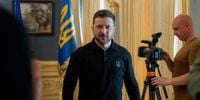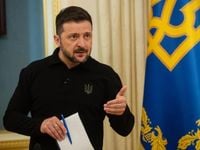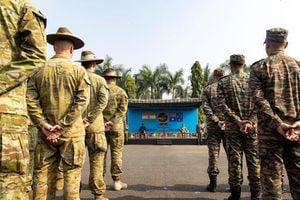Ukrainian President Volodymyr Zelensky has firmly stated that Ukraine will not legally recognize Russia's occupation of Crimea under any circumstances, reiterating the country's constitutional stance on the matter during a briefing in Kyiv on April 22, 2025. Zelensky emphasized, "There’s nothing to talk about here. This is against our constitution. This is our territory – the territory of the people of Ukraine." His comments come amid reports that the recognition of Crimea as Russian territory is being considered as part of a U.S.-backed proposal aimed at ending the ongoing war in Ukraine.
Zelensky's warning is significant, as he stated that any discussion regarding Crimea risks shifting negotiations into a framework dictated by the Kremlin, which could prolong the conflict. He added, "As soon as talks about Crimea and our sovereign territories begin, the talks enter the format that Russia wants — prolonging the war – because it will not be possible to agree on everything quickly." This sentiment reflects a growing concern among Ukrainian officials about the implications of U.S. diplomatic strategies.
On April 14, U.S. Special Envoy Steve Witkoff mentioned in an interview with Fox News that a potential peace deal could center on the status of five territories, including Crimea, which Russia illegally annexed in 2014, along with the partially occupied regions of Donetsk, Luhansk, Zaporizhzhia, and Kherson. The Ukrainian delegation is expected to present its position at a follow-up meeting in London on April 23, 2025, where discussions will continue among delegations from Ukraine, the United States, the United Kingdom, and France.
During the upcoming meeting, Zelensky stated that the Ukrainian delegation will have a mandate to discuss terms for a full or partial ceasefire with Russia. However, he made it clear that Ukraine is ready to negotiate only after an unconditional halt to hostilities. "We've been at war for over 11 years," he said. "Is it possible to reach an agreement with Russia quickly? No, it is not. It is impossible without pressure." Zelensky stressed the necessity of sustained international pressure, particularly from the United States, to reach a meaningful settlement.
Amid these developments, U.S. Secretary of State Marco Rubio unexpectedly canceled his planned trip to London, raising questions about the progress of peace talks. Rubio's decision followed a pattern of frustration within Washington regarding the pace of negotiations. In his absence, Keith Kellogg, President Donald Trump's envoy for Ukraine and Russia, will lead the American delegation. Ukrainian Foreign Minister Andrii Sybiha, Chief of Staff Andriy Yermak, and Defense Minister Rustem Umerov are also present in London.
Reports indicate that the U.S. proposals presented in Paris last week include a controversial provision that would require Ukraine to recognize Russia’s annexation of Crimea. This has sparked strong opposition from Kyiv. Zelensky pointed out that discussing Crimea only aids Russia, allowing it to maintain its aggressive posture. He stated, "We know where these signals are sounding and will continue to sound," reflecting his awareness of the complex diplomatic landscape.
In a related development, Russian President Vladimir Putin has reportedly offered to freeze fighting along current front lines as part of a potential agreement, according to the Financial Times. This offer comes after a 30-hour Easter truce declared by Moscow, which both sides accused each other of violating. However, Kremlin spokesman Dmitry Peskov cautioned against rushing the peace process, stating, "The settlement issue is so complex that it would be wrong to put some tight limits to it and try to set some short timeframe for a settlement, a viable settlement – it would be a thankless task."
As diplomatic efforts continue, Russian forces have intensified their attacks on civilian infrastructure. Reports from the Dnipropetrovsk region indicate that a drone attack on a bus carrying workers killed nine people, while other drone strikes targeted civilian infrastructure in Odesa, injuring two and causing several fires. Local officials warned that the latest Russian attacks almost guarantee civilian casualties and highlight the ongoing threat to public infrastructure.
In the backdrop of these events, U.S. President Donald Trump and Zelensky have clashed over the pace and direction of peace negotiations. Trump has criticized Zelensky for his refusal to recognize Russia's occupation of Crimea, labeling it an inflammatory statement that complicates efforts to achieve a peace deal. Trump stated, "Nobody is asking Zelensky to recognize Crimea as Russian territory but, if he wants Crimea, why didn’t they fight for it eleven years ago when it was handed over to Russia without a shot being fired?" This rhetoric underscores the tensions between U.S. and Ukrainian positions in the ongoing conflict.
As the situation evolves, Zelensky's chief of staff, Andriy Yermak, reiterated Ukraine's commitment to maintaining its core principles during negotiations, emphasizing the need for a ceasefire and respect for territorial integrity. The upcoming talks in London represent a critical juncture in the search for peace, with both sides aware that the stakes are high.
While the U.S. administration has expressed a desire to broker peace, the terms being proposed—particularly regarding Crimea—pose significant challenges for Ukraine. The potential recognition of Crimea as Russian territory is seen as a significant concession that many in Kyiv view as unacceptable. Zelensky's firm stance against any recognition of the occupation reflects a broader sentiment among Ukrainians who view Crimea as an integral part of their nation.
As discussions continue, the international community watches closely, hopeful for a resolution but wary of the complexities involved. The situation remains fluid, and the outcome of the London talks may well shape the future of Ukraine and its territorial integrity for years to come.





